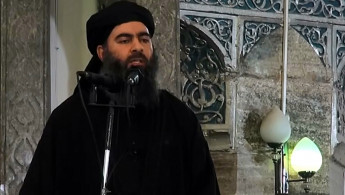Still no proof Baghdadi is dead, says US security chief
The US defence chief says the Pentagon is still not convinced Islamic State group leader Abu Bakr al-Baghdadi is dead, following recent reports about the militant's demise.
Yet Jim Mattis did not go as fair as denying the report made by the Syrian Observatory for Human Rights that Baghdadi, following an explosive claim about his death by the monitoring group earlier this week.
"If we knew, we would tell you - right now, I can't confirm or deny it," Mattis said.
"Our approach is we assume he's alive until it's proven otherwise, and right now I can't prove it otherwise."
The US has doubled its efforts to find Baghdadi, with drones and aircraft scanning the sparsely populated desert region between Syria and Iraq.
"We'll go after him until he's gone," Mattis said.
New efforts to locate Baghdadi follow the collapse of the IS' self-declared caliphate with the group's two main urban centres falling, or appearing about to.
Iraqi forces managed are finishing off the last pockets of resistance in Mosul, including areas around the Grand Mosque of al-Nuri from where Baghdadi made his only public appearance in 2014.
Kurdish-led forces are also pushing deeper into IS' self-declared "capital" Raqqa, which could have been touted as another possible location of Baghdadi during the heydays of the group.
The US believe that the IS chief is most likely hiding out in the desert region between the Syria or Iraq borders following its collapse in Raqqa and Mosul.
There have been numerous reports about Baghdadi's alleged demise, including one in June by Russia but offered no proof to back their claim.
The Syrian Observatory's stroy was scant on facts - with no information about how or when he died - but the monitor insisted it received the information from "trusted sources".
But with a huge aerial assault on IS territories by the US-led coalition, many media outlets believe there is more substance to this claim.
The US have put a $25 million bounty on Baghdadi's head and the elusive jihadi is thought to be paranoid of informers within his ranks.
This has seen him constantly on the move, intelligence chiefs believe, avoiding any electronic communication and instead relaying messages to commanders and officials via trusted couriers.





 Follow the Middle East's top stories in English at The New Arab on Google News
Follow the Middle East's top stories in English at The New Arab on Google News

![Israeli forces ordered bombed Gaza's Jabalia, ordering residents to leave [Getty]](/sites/default/files/styles/image_330x185/public/2176418030.jpeg?h=a5f2f23a&itok=_YGZaP1z)
